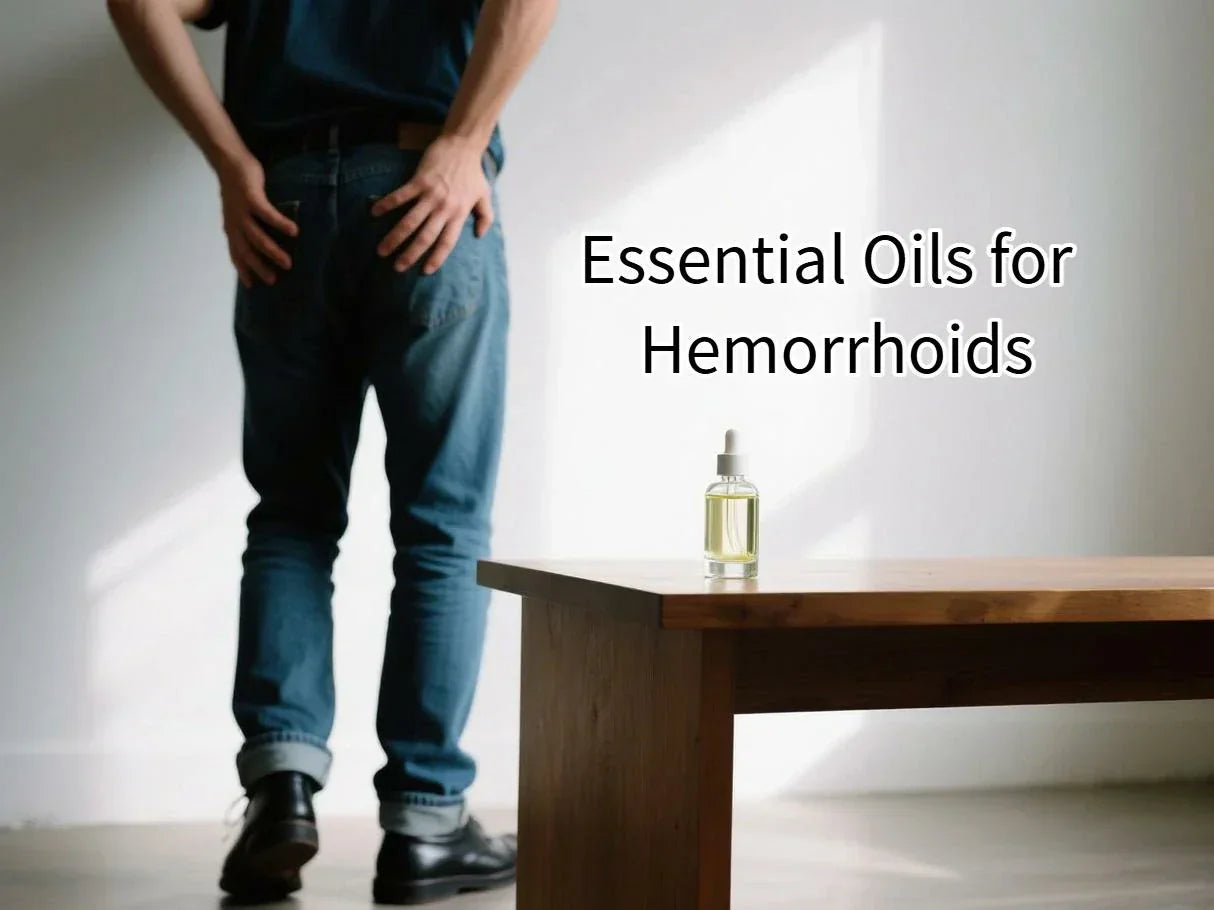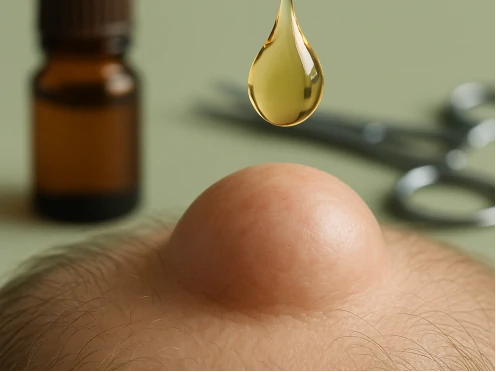According to the National Institute of Mental Health, Obsessive-Compulsive Disorder (OCD) is a chronic mental health condition where intrusive thoughts (obsessions) trigger repetitive actions (compulsions). Living with OCD can be overwhelming and may affect work, relationships, and peace of mind. People often wonder: Are there natural remedies to help manage the stress and anxiety that come with OCD? This has led to growing interest in the use of essential oils — OCD essential oils routines are now being explored by many individuals with OCD seeking relief beyond standard care.
Essential oils and OCD management is a topic many are curious about. While standard treatments like therapy and medication are the backbone of OCD care, some look for complementary tools—especially to help reduce anxiety and promote relaxation. This article explores whether using essential oils for obsessive compulsive disorder has any scientific support—addressing common searches like essential oils OCD and separating facts from hype.
The Science of OCD: Neurobiology, Stress, and the Need for Calming Approaches
Mental disorders, including OCD, are common worldwide and pose major challenges to individual wellbeing and health systems, according to the World Health Organization. OCD is a complex brain-based disorder. Changes in certain brain circuits, especially those linked to serotonin (a chemical involved in mood and anxiety) and GABA (a calming brain messenger), play a key role.
Chronic stress can make OCD symptoms worse. When stress spikes, obsessions and compulsions may feel harder to control. Finding ways to reduce anxiety and calm the nervous system can make a difficult day more bearable. This is why some people look to natural, calming solutions like aromatherapy.
Why do people consider essential oils for OCD?
- Essential oils have been used for thousands of years for emotional comfort and relaxation.
- Smells influence the brain’s emotional centers, which may help ease nervous tension and promote a sense of calm.
- Some animal research suggests specific essential oils might help reduce anxiety—or even behaviors similar to compulsions.
According to a 2013 study published in Evidence-Based Complementary and Alternative Medicine, certain essential oils may modulate neurotransmitters related to anxiety and mood regulation, potentially offering relief for stress-related symptoms. Still, the science on essential oils directly relieving OCD is just starting to grow. However, many believe that essential oils can help reduce mental tension. Even when not addressing the core disorder, a well-chosen oil can help ease the burden of daily symptoms.

Can Essential Oils Help OCD? What Science Says
Many wonder: Do essential oils help OCD, or just ease stress?
- Direct science linking essential oils and OCD is limited.
- Most studies are on animals, using models for compulsive behavior (like the marble-burying test in mice).
- Some oils (bitter orange/citrus) reduced compulsive-like behaviors in animal models.
- For people, most evidence comes from studies on anxiety, sleep, or mood—not obsessions or compulsions specifically.
- Anecdotal (first-hand) stories suggest temporary relief of stress, not complete symptom remission.
- No scientific evidence shows that essential oils cure obsessive compulsive disorder.
Still, essential oils can be used to help soothe stress and may offer short-term comfort, especially before therapy sessions or in daily routines.
Best Essential Oils for OCD: Evidence and Effects
Different essential oils are often used for OCD support based on their ability to ease feelings of anxiety and stress and promote relaxation. Each essential oil is known for specific effects on the nervous system and emotional regulation. Here’s a look at what each oil offers:
| Essential Oil | Effects & Evidence | How It’s Used |
| Lavender Oil | Most studied; helps reduce anxiety level and improve sleep. Balances mood. | Diffusion, topical, baths |
| Chamomile Oil | Soothes agitation, calms nerves, may help intrusive thoughts. | Diffusion, topical, baths |
| Frankincense Oil | Eases mood swings, grounding effects, promotes sense of comfort. | Diffusion, inhalation |
| Ylang Ylang Oil | Balances emotions, melts away tension, supports relaxation. | Diffusion, blends |
| Bergamot Oil | Lifts mood, reduces stress, may ease “brain fog”. | Diffusion, topical (well diluted) |
| Lemon Oil | Energizing, thought to help concentration and mental clarity. | Diffusion, blends |
| Peppermint Oil | Alerts the mind, can help with overwhelm and focus. | Diffusion (in small doses) |
| Bitter Orange Oil | In animal research, reduced compulsive behaviors. | Diffusion, blends |
| Valerian Oil | Calms the nervous system, supports restful sleep, modulates GABA. | Nighttime diffusion, blends |
| Patchouli Oil | Grounds the emotions, may help settle anxious thoughts. | Diffusion, topical, blends |
Unique Points on Specific Oils
- Lavender essential oil is well known for calming properties and improving sleep—a struggle for many with OCD.
- Frankincense essential oil is reported to “ground” and soothe, making it popular for stress-prone days.
- Chamomile essential oil may help smooth agitation linked to obsessions or transitions.
- Ylang-ylang essential oil supports a relaxed, balanced emotional state.
- Peppermint oil can aid focus during therapy.
Safety, Contraindications, and Best Practices
Want to start using essential oils and OCD self-care routines? Safety always comes first. While essential oils have therapeutic potential, caution is necessary due to possible adverse reactions such as skin irritation and photosensitivity, as well as interactions with medications, according to research published in Molecules.
General Safety Tips
- Always dilute oils before skin use—usually with a carrier oil like coconut, almond, or jojoba (about 1-2% dilution is safest for adults).
- Start with diffusing before trying topical use.
- Test a small amount of diluted oil on your skin to check for reactions.
Who should use extra caution?
- Children: Many essential oils are safe only in very small, diluted amounts. Lavender and chamomile are typically the first choices for kids.
- Pregnant or breastfeeding people: Some oils are off-limits; speak with a healthcare provider first.
- Elderly or those with sensitive skin: Start mild, patch test, and avoid strong oils.
- Medical interactions: Some oils may interact with seizure medication or anti-anxiety drugs.
Potential Issues
- Photosensitivity: Citrus oils (like bergamot, lemon) can make the skin burn easily in sunlight—use them in areas covered by clothes, or at night.
- Allergies: Rashes, headaches, or breathing issues may be signs to stop using that oil.
- Never ingest oils unless directed by a medical professional.
Consult a mental health or medical provider before making changes to your OCD treatment plan.
How to Use Essential Oils for OCD Support
How can you safely make essential oils a part of your day? Here are proven, practical steps.
Popular Methods
- Aromatherapy Diffusion: Add 3–6 drops of your chosen essential oil into a water-based diffuser. Breathe deeply for 10–30 minutes, especially before therapy, bedtime, or stressful tasks.
- Topical Use: Mix 2–3 drops of essential oil with 1 tablespoon of carrier oil. Gently rub onto pulse points (wrists, behind ears, chest), temples, or back of the neck. Never use undiluted oils on sensitive areas.
- Relaxing Baths: Combine 3–6 drops of oil with Epsom salts and swirl into a warm tub. Lavender, chamomile, and frankincense work well for this.
- Mindful Rituals: Use an “aroma inhaler” (cotton loaded with a drop or two, placed in a personal inhaler tube) for quick scent focus during moments of anxiety.

Sample Calming Blend
For relaxation and stress:
- 2 drops lavender
- 1 drop bergamot
- 2 drops chamomile Mix into 1 tablespoon of carrier oil.
Integrating Essential Oils Into Your OCD Care Plan
Working with a mental health professional is essential. Here’s how you can mix natural remedies like essential oils with standard OCD treatment:
- Supplement, don’t replace: Essential oils can support but cannot replace cognitive-behavioral therapy (CBT), exposure and response prevention (ERP), or medication.
- Talk to your care team: Let your therapist or doctor know if you want to use essential oils for managing OCD symptoms.
- Set realistic expectations: Oils may help reduce anxiety, improve mood, or aid sleep, but won’t erase obsessions or compulsions.
- Avoid overreliance: Essential oils are a tool—not a cure for obsessive compulsive disorder.
- Mark progress: Keep a journal or symptom tracker to see if a specific essential oil is making a positive difference for you.
Track Your Progress: Make Aromatherapy Personal and Practical
Want to understand whether essential oils are making a difference in your OCD self-care routine? Creating a simple tracking journal can help you notice patterns, refine your approach, and stay mindful of what works best for your mind and body.
Consider noting down:
- Which oils you used (e.g., lavender, bergamot, frankincense)
- How and when you used them (diffusion before bed, topical before therapy, etc.)
- Your anxiety or stress level before and after use (use a 1–10 scale for consistency)
- Any changes in mood, focus, or sleep
- Reactions or side effects, if any
Even a brief daily log can help you identify which blends are most effective at which times of day—for example, whether bergamot oil calms your nerves best before social interactions, or if frankincense oil improves your sleep on stressful nights.
Tracking your experience turns essential oil use into an intentional practice—not just a habit—and encourages better communication with your healthcare provider. Over time, this awareness may empower individuals with OCD to build more structured, effective routines that complement their existing care.
Choosing Quality Essential Oils: Purity, Safety, and What to Look For
Not all essential oils are created equal. For OCD support, always choose therapeutic-grade oils. Look for brands that offer:
- GC/MS test results (for purity and component breakdown)
- No synthetic additives or fragrances
- Clear labeling and Latin botanical names
- Dark glass bottles and dropper caps
Trusted suppliers often disclose their sourcing and extraction methods. Avoid overly cheap products with unclear origins.

Myths, Marketing Claims, and The Placebo Question
Essential oils cannot cure OCD. Some websites and social media promise more than the science supports.
Watch out for:
- Overly bold claims: No oil “cures” obsessions or compulsions.
- Pressure sales tactics: Rely on your needs, not marketing hype, to shape your plan.
- Placebo effect: Feeling calmer from a soothing routine isn’t the same as treating the underlying disorder—but relaxation can make daily life easier.
Tips for Smart Use
- Search for reliable support and science, not quick fixes.
- If you feel worse or start skipping therapy in favor of oil use, talk with your clinician.
Case Stories, Expert Quotes, and Real-World Experiences
What do mental health experts say?
“Essential oils cannot treat OCD on their own. They are best seen as a complementary approach… Consult with a mental health professional trained to treat OCD.”
“Essential oils aren’t a cure—but they are a gentle, effective way to help calm a dysregulated brain.”
What do real people share?
In online support groups, people with OCD tell stories of:
- Sleeping better after using lavender oil during bedtime.
- Feeling calmer before therapy by diffusing bergamot or ylang ylang.
- More focus and easier breathing with peppermint oil during exposure response prevention exercises.
These changes are usually temporary and support mood or relaxation, not the obsessions or compulsions themselves.
The Role of Essential Oils in Cultural and Traditional Healing
People from many cultures have used essential oils for mental well-being long before modern medicine. In Ayurveda (traditional Indian health care), oils like frankincense and lemon have calming uses. Western herbalism has long valued chamomile and lavender essential oil for sleep and relaxation. Ritual use of scent—baths, anointing pulse points, or prayer—often aims to comfort and steady the mind. Although these practices are meaningful and supportive to many, scientific evidence still focuses on stress and anxiety, not clinical OCD.
Conclusion & Key Takeaways
Essential oils and OCD management is best viewed as a natural, supportive tool, not a substitute for medical care. Oils like lavender, chamomile, bergamot, and frankincense can support relaxation, reduce anxiety and stress, and create comfort for people living with OCD. These essential oils—OCD-friendly and supportive—offer relief when used properly. There is no proof they address obsessions or compulsions directly, but they may provide short-term relief for anxiety and aid sleep or emotional balance.
Key Takeaways:
- Oils like lavender and frankincense support relaxation—not a cure for OCD.
- Always use oils safely: dilute, test, and avoid strong exposure.
- Essential oils can be used as part of your broader toolbox—never alone for OCD management.
- Communicate with your mental health or medical care team about starting any new natural remedies.
- Seek support from evidence-based treatments (like CBT and ERP) as your main OCD care.
Want to learn more or track your progress? Use symptom charts, dosing guides, or refer to research links below for more in-depth information. Safe use and honest expectations make all the difference in your natural remedy for managing OCD symptoms.
Essential Oils and OCD: FAQ
What essential oil helps with OCD?
Lavender, chamomile, bergamot and frankincense are a few ingredients that are especially good for relaxation and anxiety relief in general, and can come in handy when aiding in the treatment of obsessive-compulsive disorder. Bitter orange, before animal experiments show that it can reduce compulsion-like behavior, but put on people, there is currently not much evidence to prove that it has this effect.
Are specific essential oils safe for children with OCD?
If you want to use essential oils for children with OCD, lavender and chamomile are relatively more reassuring, but the premise is that they must be strictly diluted in place. Dosage, be sure to follow the principle of “less is less”, with just the smallest dose of effective, never put the pure essential oils directly to the child's skin, that will bring big trouble. After all, a child's skin is much thinner than an adult's, and their respiratory tract is fragile, which can cause problems if they are not careful. For the sake of your child's health, it is important to consult with a pediatrician or child healthcare professional before using any essential oils to avoid the risk of allergies and prevent other adverse conditions.
Can essential oils replace my medication or therapy?
Essential oils can at best help relieve stress and improve sleep, but they are not a cure for the core problem of OCD. Remember, you can't just stop taking the medication you've been prescribed or the treatment you're doing. This is no joke. You have to be under a doctor's supervision before you can adjust your treatment program, or else you can easily delay your condition.
What’s the best way to use essential oils for managing OCD symptoms?
Most people use essential oils, direct drops in the diffuser to let the fragrance in the air, or mixed in the base oil applied to the skin (like massage, bath time with), the effect is quite good. However, the use of essential oils must pay attention to a persistent, regular use than the occasional use of the effect is much more obvious.
Can essential oils cause side effects or interfere with medications?
Yes. Skin reactions, headaches, and possible drug interactions can occur. Citrus oils can cause sun sensitivity. Always start with small amounts and discuss with a medical provider if you’re on medication.
References



Leave a comment
This site is protected by hCaptcha and the hCaptcha Privacy Policy and Terms of Service apply.